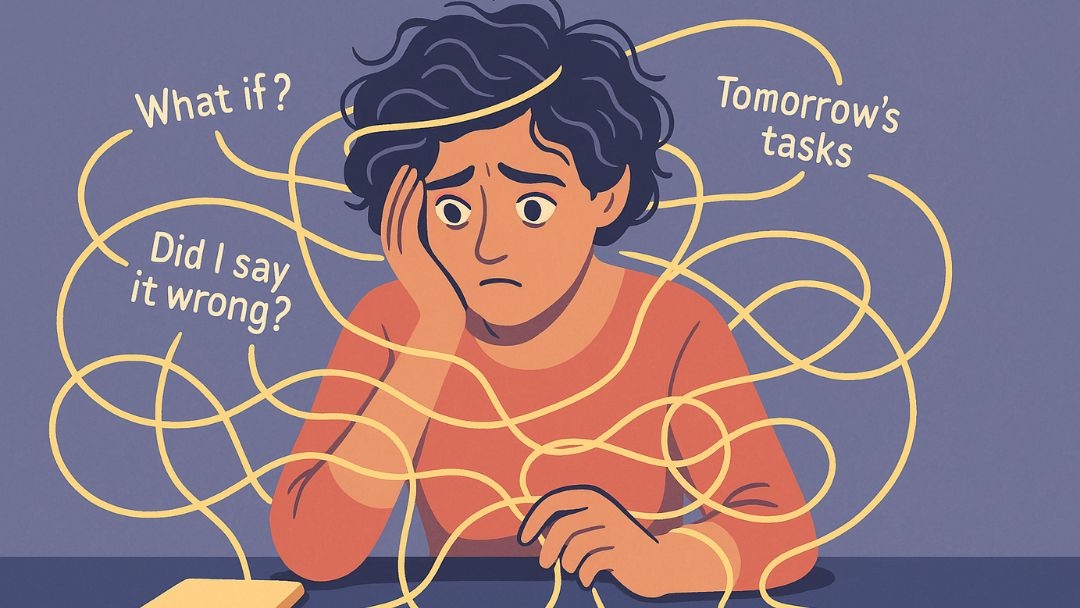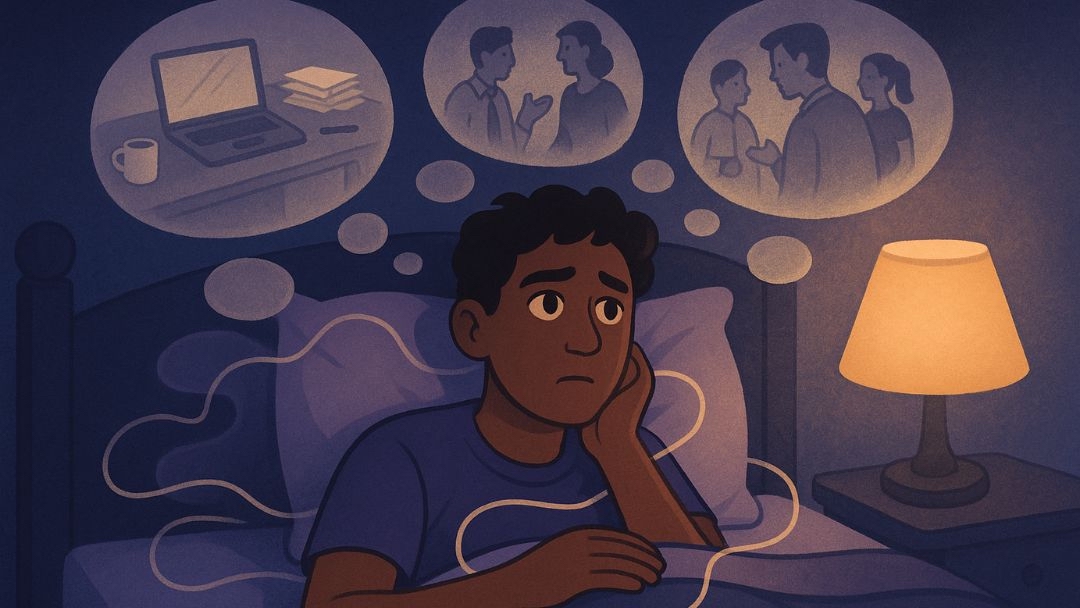Why Do I Overthink Everything? 6 Reasons You Can’t Switch Off Your Thoughts
Ever wonder, "Why do I overthink everything?" This article uncovers the real reasons behind overthinking, from perfectionism and self-doubt to emotional sensitivity and past trauma. Learn how to calm your thoughts, quiet mental loops, and rebuild a peaceful relationship with your mind.


Back
7 mins read
If my brain had a “pause” button, I’d probably have worn it out by now. Sometimes, I can’t stop replaying what I said, wondering how others took it, taking their reaction personally, or planning what I’ll do differently next time. Even when I try to let it go, my mind circles back, dragging the same thoughts across a mental track that never seems to end.
If you’ve ever found yourself lying awake thinking about something that happened hours (or even years) ago, you know exactly how exhausting it feels. Overthinking can trap us in a state of constant self-analysis, where every thought feels like both the problem and the solution.
For years, I even believed that if I just thought harder, I’d finally find peace. But I eventually learned that overthinking isn’t about thinking too much — it’s about feeling too much and not knowing what to do with it. Every anxious thought was my mind’s attempt at protection, trying to keep me safe from something I couldn’t quite name.
So when we ask, “Why do I overthink everything?”, what we’re really asking is, “What is my mind trying to protect me from?”
This article explores the emotional and psychological roots of overthinking — why it happens, why it feels so personal, and how understanding the reasons behind it can help you change the relationship you have with your thoughts.
Why Do I Overthink Everything (and Why It’s Different for Everyone)

Overthinking isn’t really about intelligence — it’s about emotional control, or rather, the mind’s attempt to find it. When emotions feel uncertain, the brain tries to restore safety by thinking its way out. Logic becomes a shield.
This process creates what psychologists call a mental loop, a repetitive cycle of thoughts meant to predict or prevent discomfort. Each loop promises clarity: “If I think a little longer, I’ll find the answer.” But instead of peace, it creates exhaustion.
At the heart of overthinking are two powerful biases:
- Prediction bias: the belief that more thought means more preparedness. The brain mistakes anticipation for control.
- False certainty: the drive to turn emotional tension into logical closure. The mind convinces itself that if everything is analyzed, uncertainty will disappear.
And beneath both lies emotional reasoning — the habit of assuming strong emotions must mean something is wrong. When anxiety surfaces, we interpret it as a warning. When sadness appears, we think something is broken. The mind can’t tolerate ambiguity, so it fills silence with noise.
That’s why labeling emotions helps interrupt rumination. When you name what you’re feeling, the brain shifts from the emotional center (the limbic system) to the reasoning center (the prefrontal cortex). Thought stops running wildly because it finally knows what it’s running from.
Still, emotional regulation isn’t the only reason people overthink. There’s no single blueprint for it. Each of us overthinks for different reasons, rooted in our personalities, experiences, or emotional patterns. Some overthink to manage fear, others to manage uncertainty, and some because they were taught that staying alert was the safest way to live.
Related: How Do I Get to Know Myself Better? 11 Practical Tips
6 Most Common Triggers That Make You Overthink

Behind every episode of overthinking lies a familiar trigger, shaped by how it learned to stay safe. Here are the six most common triggers that fuel overthinking — each revealing something different about how your mind tries to feel secure:
1. The Perfectionist’s Loop and the Fear of Failure
Perfectionists overthink because their brains equate control with safety, replaying every detail to avoid failure or judgment.
For perfectionists, Type A personalities, and high achievers, overthinking feels responsible — even productive. The mind convinces itself that if every angle is analyzed, mistakes and judgment can be avoided.
But this isn’t a strategy. It’s fear of failure disguised as diligence. Beneath the planning lies a deeper belief: “If I get everything right, I’ll be safe from regret or disapproval”.
The brain replays every detail to secure that safety, but safety built on perfection never lasts. No scenario ever feels “ready enough.” Over time, the constant rehearsal drains creativity and energy, where fear becomes the editor of every thought.
Try this mental shift: Instead of asking, “How can I make this perfect?”, try “What’s good enough for now?” Each time progress replaces perfection, the mind relearns that movement — not certainty — builds confidence.
2. Low Self-Esteem and Self-Doubt
Low self-esteem fuels overthinking by making the mind seek reassurance through constant analysis and self-comparison.
When you have low self-esteem, every interaction turns into a mental audit. We replay conversations, scrutinize tone, or interpret silence as proof of rejection. The mind treats approval as oxygen, and overthinking becomes a way to keep breathing.
This pattern isn’t about curiosity; it’s about reassurance. The mind hopes that by analyzing, it can finally feel “enough.” But reassurance fades fast, and the cycle begins again — one thought away from self-doubt, one doubt away from another loop.
Try this mental shift: When your thoughts start circling how others perceive you, pause and ask, “What part of me feels unseen right now?” Grounding in your own worth interrupts the endless mental need to “check” yourself through others’ eyes.
3. Attachment Anxiety and the Need for Closure
Anxious attachment triggers overthinking when the mind mistakes uncertainty for rejection and tries to regain emotional safety through mental control.
Not everyone overthinks because they crave control. Some do it because uncertainty feels unsafe. When emotional closeness feels unpredictable, the mind starts scanning for signs of threat — a tone, a silence, a delay. Relationships often trigger this type of mental monitoring.
But the truth is, this is attachment anxiety in motion. The brain tries to preserve connections by predicting disconnection. It’s not overanalysis for its own sake; it’s a defense against emotional shock.
That’s why it’s common to feel trapped in endless “what did they mean?” thoughts. The mind equates information with safety, even if the “facts” it finds are imagined. But relationships aren’t puzzles to be solved. They’re experiences to feel.
Try this mental shift: When uncertainty feels unbearable, remind yourself, “Uncertainty isn’t rejection.” Then redirect your focus to your body, such as slow breaths or unclenched shoulders. Anxiety begins in the body long before it reaches the mind. The goal isn’t to eliminate uncertainty but to learn that space in connection can coexist with safety.
4. Emotional Sensitivity and Deep Processing
Sensitive minds overthink because their heightened sensitivity makes it harder to release emotions.
For highly sensitive people, thinking deeply is second nature. We absorb others’ emotions easily, notice subtle shifts in tone or expression, and process meaning long after the moment has passed. That empathy is a gift until it becomes an overload.
When emotions hit hard, the mind rushes to make sense of them. It replays what happened, not to understand it better, but to shrink the feeling into something more manageable.
The irony is that emotional sensitivity doesn’t need more containment. It needs more releases. When feelings aren’t expressed or accepted, they turn into thoughts that echo endlessly.
Try this mental shift: When emotions start to tighten into over-analysis, take a sensory break. Step outside, breathe deeply, or move your body. Let sensory experience anchor you before your mind starts translating everything into meaning.
5. Past Trauma and the Hypervigilance Loop
Past trauma leads to overthinking by training the brain to stay hypervigilant, scanning for threats even when life is calm.
For those who’ve experienced trauma, overthinking isn’t just a mental habit, but a survival mechanism. The brain that once stayed alert to survive chaos learns to equate prediction with safety. Even when life calms, the nervous system stays on guard, scanning for signs of danger that no longer exist— a state psychologists call hypervigilance.
Research on PTSD shows that trauma can rewire the brain’s threat system, making it hyper-alert to potential danger. This constant threat scanning keeps the anxious mind in “scan mode,” rehearsing worst-case scenarios even in peaceful moments. What once kept you safe now keeps you stuck.
Over time, this state of readiness exhausts both the mind and body, leading to tension, racing thoughts, and emotional fatigue.
Try this mental shift: When your thoughts drift, tell your body, “It’s okay to stand down.” Grounding with sensory awareness — textures, sounds, breathing. Let the body lead the mind back home.
6. Personality and Temperament
Introspective or analytical personalities naturally overthink, turning reflection into rumination when thoughts go unexpressed.
Some minds are simply wired for introspection. Personality and temperament influence how much mental “processing” a person does, and for some, it’s a lot.
Introverted or intuitive people, for example, naturally spend more time in internal dialogue. Their ability to notice subtle details and emotional cues is a strength, but it can easily turn into self-analysis overload.
For those with high sensitivity, analytical thinking, or conscientiousness, reflection can slip into overthinking. The mind begins to equate awareness with control, assuming that thinking more will make uncertainty less threatening.
Try this mental shift: Don’t fight your depth — structure it. Channel introspection into something expressive or time-bound, like journaling, art, or timed reflection. Turning inward is healthy when it leads somewhere, not when it traps you there.
Is It Normal to Overthink Everything? (AKA, When Is It a Problem?)

Yes — to a point. Overthinking is incredibly common, especially among people who are emotionally aware, introspective, and deeply reflective. In moderation, it’s a form of care, an attempt to understand feelings, people, and outcomes more clearly.
But it becomes draining when reflection turns into rumination, when we think about emotions instead of experiencing them. Healthy thinking brings clarity; overthinking brings confusion dressed up as insight.
Here’s a quick gut check:
- Does thinking help me move forward or keep me stuck?
- Do I feel lighter or heavier afterwards?
- Am I gaining understanding or recycling fear?
- Am I analyzing reality, or imagining possibilities?
If your answers lean toward the second half of each question, your thinking has crossed into self-sabotage territory. Sometimes, what we call “overthinking” is really a signal that one or more areas of emotional intelligence need attention — like self-awareness, emotional regulation, or empathy. These skills shape how we interpret emotions and respond to uncertainty. When they’re out of balance, thoughts rush in to fill the gaps.
Exploring your emotional intelligence can help you understand which areas come naturally to you and which ones might need more support. It’s one of the most effective ways to turn awareness into calm, providing your mind with new tools for clarity rather than control.
Take our Emotional Intelligence Test to find out where your strengths and growth areas lie.
Your Mind Isn’t Broken — It’s Overprotective

If you overthink everything, it doesn’t mean you’re weak, neurotic, or dramatic. It means your brain learned to build safety through thought, because feeling once felt too risky. Somewhere along the way, thinking became protection, and your mind hasn’t yet realized it’s safe to rest.
But there’s another way to live. One where thinking and feeling coexist without competing. Where self-reflection brings peace instead of pressure. Where understanding doesn’t require exhaustion.
The next time the mind starts its familiar loops, pause for a moment. Beneath all that noise, there’s usually an emotion waiting to be acknowledged, not solved.
And if you’re ready to take that next step from understanding to action, read our How to Stop Overthinking guide to learn simple ways to calm your thoughts and find mental clarity. Because when you finally trust that it’s okay to feel before you think, your mind at long last exhales.


Return to Blog






